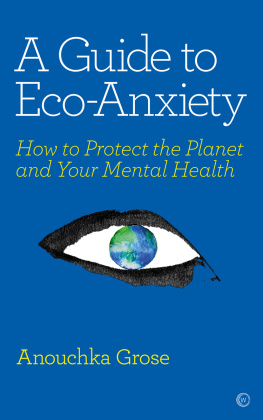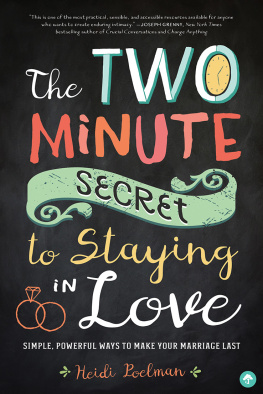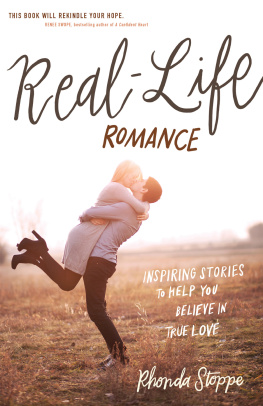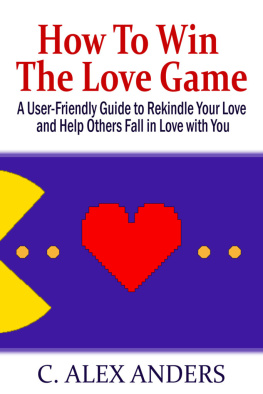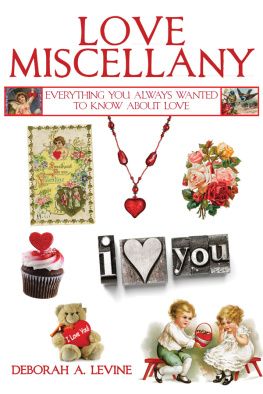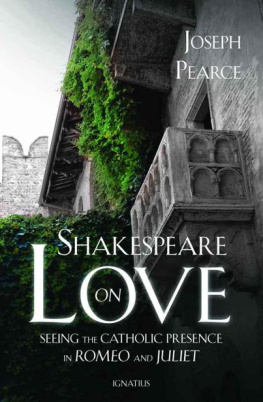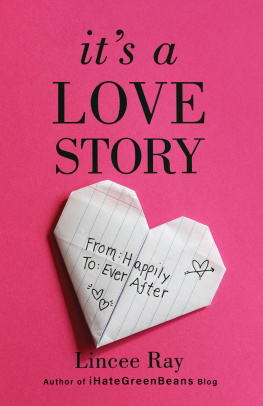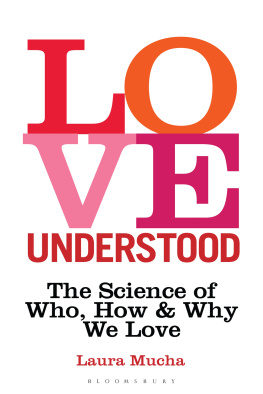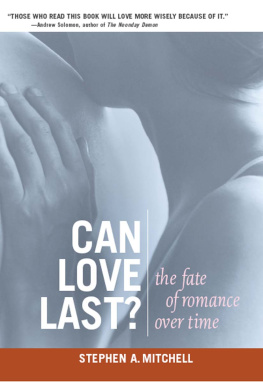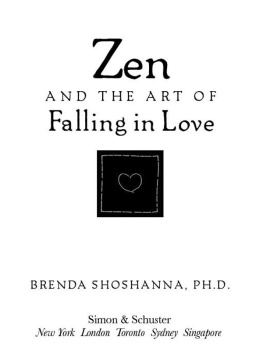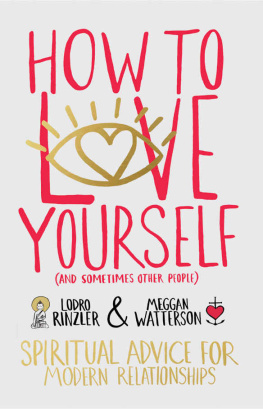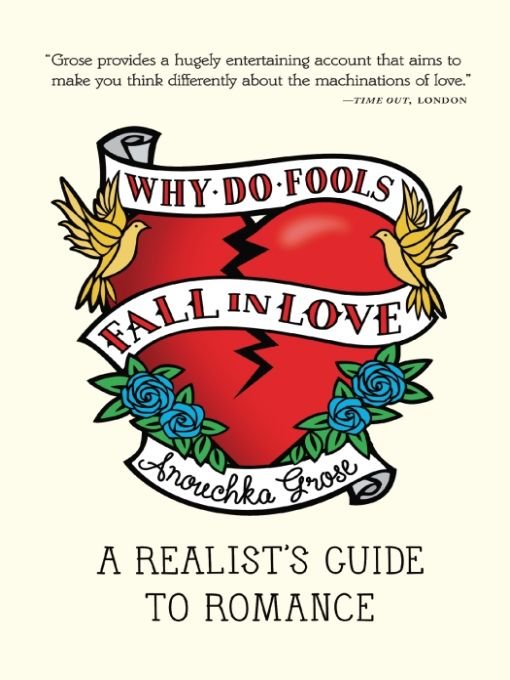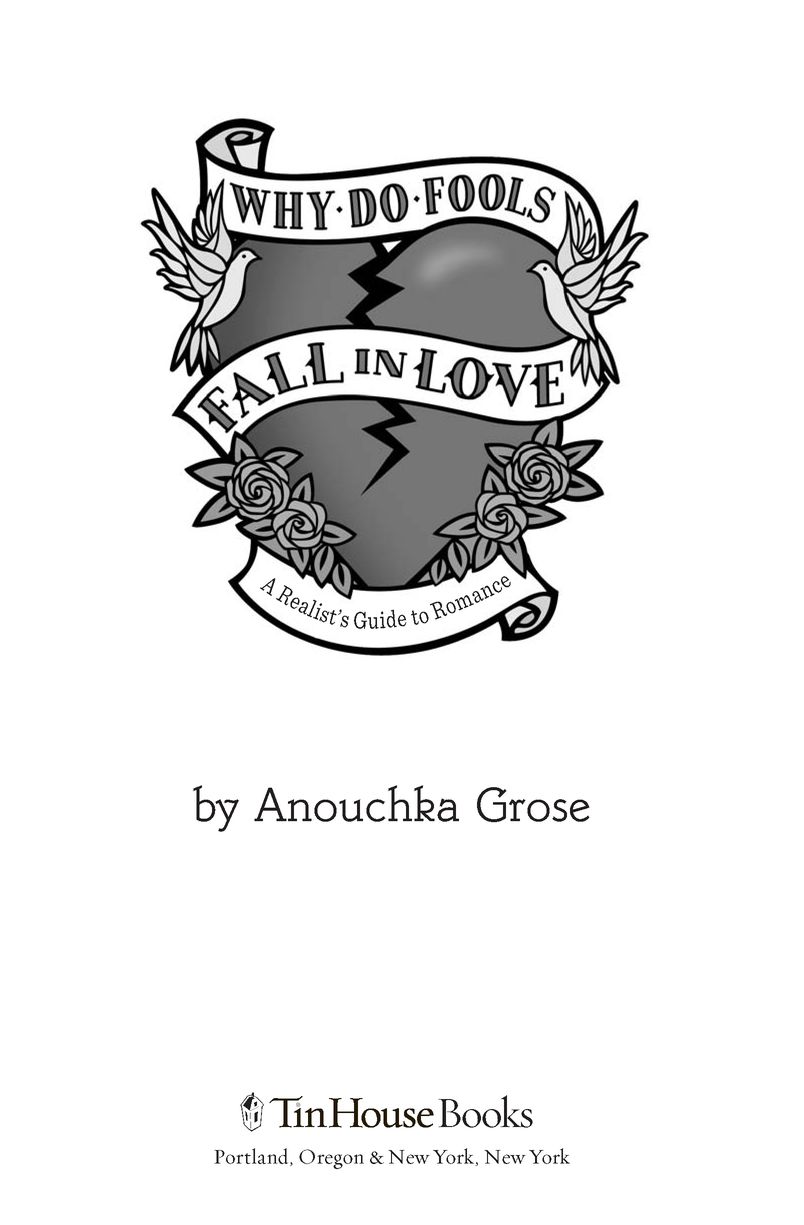Table of Contents
FOR MARTIN
Love is the magician that pulls man out of his own hat.
BEN HECHT
Introduction
It would be reasonable to say that the last thing the world needs is yet another book about love. It would also be reasonable to speculate that without love there would be no books in the first placeso whos going to quibble about one more?
The human tendency to bond and fight is at the heart of our culture. We seem to have a burning need to speak, write and sing about attachment and separation: what brings people together, and what makes them break apart. The great thing about books, songs, films and poems about love is that they dont even have to be very different. Love is such a pressing issue for humanity that the subtlest variations seem to matter. The charts are always full of records detailing the intricacies of the first six months of romance. You wanna dance with somebody, you cant get them out of your head, youve really got the feeling, and so on. And then theres the aftermath: youre never gonna dance again, youre leaving on a jet plane and every day you love them less and less. Extreme emotions are charmingly packaged into accessibleand often strangely addictiveblocks of sound. Theyre all a bit similar and a bit dissimilar. Love songs also make endless attempts to define exactly what love is: Love is Strange, Love is Like a Butterfly , Love is Noise, Love is Hell, Love is All There is, Love is My Religion, Love is a Number, Love is a Losing Game, Pain is Love, Love is a Serious Business, Love is Blue, Love is Only Love ... If you can convincingly pin down something, anything about the experience of linking or unlinking yourself with another human being then you are providing a useful service. Thank you Burt Bacharach, Dolly Parton, Bjrn and Benny. Not to mention Shakespeare, Proust and Barbara Cartland. As a subject, love has proved equally inspirational for poets, novelists, playwrights and film directors. Our appetite for stories about love appears to be inexhaustible.
For scientists too, its a compelling topic. According to modern science, love has been essential to our survival and evolution as a species. Recent developments in neuroscience give us new ways of thinking about the chemical make-up of love. Its even been suggested that we give poetry a break and try to think more seriously about the mechanics of the whole business. Instead of hearts and flowers we apparently need to be thinking along the lines of hormones and neurotransmitters. Humans are basically breeding machines that function according to their programming. An appealing member of the opposite sex (assuming we dont possess the mythical gay gene, presumably) will trigger a chemical rush in us, inducing an attraction. If both parties are available they can act on this triggering and have sex. And if they procreate, then more chemicals will be released in order to ensure that they love their baby and each other. But as you can see from the way humans actually live, this machinery functions far from impeccably.
So, are literature and lyrics just part of an illusion that blinds us to the physical realities of attraction? Are all these words written in order to describe something that is already there, or do they magic it into existence? While some writers define love as a basic human need, there are also those who see it as a product of our culturesomething that was invented quite late in human development. Some historians and anthropologists would argue that love as we know it dates back to the Middle Ages, or that each period and society invents its own notion of love. What passed for love in the European courts of the eleventh century may have little to do with the practices of contemporary New Guinean tribes, or with the world of the heart so acutely described by Amy Winehouse. Theres animal attraction and then theres what we do with it, which are not at all the same thing.
This question of natural or unnatural is brilliantly played out in Baz Luhrmanns Moulin Rouge! Apparently the film was conceived as one long, relentless clich about love. Any narrative element that deviated from the norm was erased in favour of what was totally generic. Its the story of a young romantic who falls in love with a prostitute with very realistic ideas about love. He thinks its the best thing about life and that you just have to do it for no reason. She thinks its a great way to squeeze money out of stupid, rich men. She has a confusing moment when she mistakes him for a rich man, but actually likes him, and then finds out that hes a penniless writer. So he sets out to persuade her to love him for nothing. They stand on a roof and Ewan McGregor strikes out with a barrage of lines from famous love songs by KISS, U2, Joe Cocker, the Beatles, Dolly Parton, David Bowie, and whoever else has written a romantic number that half the world might be expected to recognize. When Satine, the prostitute (played by Nicole Kidman), finally has enough of McGregors warbling she fires back a line from Paul McCartneys Silly Love Songs, to the effect that enoughs enough. McGregors character, Christian, is unfazed and keeps singing. And eventually it seems to work. Satine is brought round by the power of song (and clich). But the argument has been set up: is love a sublime and mysterious force that we should submit to? Or is it part of a more pragmatic system of exchange? And, perhaps more confusingly, which is more natural and which more artificial? Is Christian following his instincts while Satine suppresses hers for financial gain? Or is it the other way round? Dont animals mate according to the economics of attractivenessbetter looks get you better stuff? And isnt pure, unadulterated romantic love a bizarre human artifice?
Satines objection to love songs seems to be that they make love appear one way, whereas the reality is something quite other. Shes certain that romantic love cant last and that, if they get together, Christian will be mean to her and shell start drinking. In other words she has the idea that love is just a temporary mirage that binds you to another person and that, once bound, you can only be unhappy. (A concept that can be biochemically backed up, if youre so inclined.) According to Satine, the best thing to do is to use the blinding illusion to extract what you canand then disappear. Although she is eventually unable to resist Christians charms, the film finishes with her dying in his arms, having just declared her love for him. Things dont get a chance to turn sour between them and the fantasy of enduring love is sustained. The overall message of the film seems to be that love is extremely compelling, but it doesnt necessarily lead to anything good. In fact it promises precisely nothingthats the point. Its just a very powerful force that you have to give in to when it inexplicably steams your way.
But having opted to give in to love, what happens next (assuming you dont immediately die of consumption)? This book tries to say something about what you might be able to expect from love in a society where pretty much anything is allowed. You can be gay or straight, monogamous or polygamous, married or singlein any combination that you think will work for you. You can dress up as a horse and pull your lover around the living room in a chariot, if you like. And, whatever youre into, you can supposedly use the Internet to find other people to do it with you. Theres no longer any stable idea of what love is or how to go about it. Instead theres an infinite number of options, all with their upsides and downsides. The choices can appear overwhelming.


